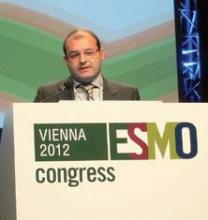VIENNA – A second prospective randomized trial has confirmed the benefits of continuing bevacizumab beyond tumor progression in metastatic colorectal cancer.
The median time to progression in the phase II BEBYP trial was 4.9 months with second-line 5-fluorouracil–based chemotherapy alone vs. 6.7 months with chemotherapy and bevacizumab (Avastin) continued without interruption from first-line therapy (hazard ratio, 0.65; P = .0062).
The benefit of continuous bevacizumab was consistent across all subgroups, including mutant and wildtype KRAS, Dr. Gianluca Masi reported on behalf of the Gruppo Oncologico Nord Ovest, which conducted the trial.
Earlier this year, the prospective, phase III 820-patient Treatment Across Multiple Lines (TML) trial reported a hazard ratio of 0.68 for progression or death and a modest 19% improvement in overall survival with continuous bevacizumab and chemotherapy in second-line metastatic colorectal cancer.
Overall survival data from BEBYP are still immature, with 52 events reported in the chemotherapy-alone arm and 46 in the bevacizumab arm after a median follow-up of 18 months, said Dr. Masi of Azienda Ospedaliero-Universitaria Pisana, Pisa, Italy. The trial was stopped early in May 2012 after results of TML were made public. BEBYP had randomized just 185 of the 262 planned patients.
Invited discussant Dr. Jean-Yves Douillard, professor of medical oncology at the University of Nantes and ICO R. Gauducheau, St. Herblain France, said, "These studies validate the use of bevacizumab beyond progression with all chemo combinations, in selected patients initially responding to bevacizumab."
He described the median progression-free survival as "quite good," particularly since the enrollment criteria for BEBYP were less strict than for TML and patients were less selected for bevacizumab sensitivity.
Still, Dr. Douillard cautioned that the 1.8-month gain in progression-free survival with the monoclonal antibody comes at a price. He highlighted an article estimating that the cost of new drugs to treat patients with metastatic colorectal cancer is $150,000-$200,000 for an additional year of life, compared with fluorouracil plus leucovorin alone (J. Clin. Oncol. 2007;25:180-6).
"There is a rising curve each time a new drug is added, and I don’t know how long we will be able to afford that," he said.
Patients in BEBYP had unresectable and measurable metastatic disease that had progressed after or during first-line chemotherapy with fluoropyrimidine, FOLFIRI, FOLFOX, or FOLFOXIRI plus bevacizumab. They were randomized to second-line FOLFIRI or modified FOLFOX-6 chemotherapy repeated every 2 weeks with or without bevacizumab 5 mg/kg on day 1 and repeated every 2 weeks. One patient was randomized twice, leaving 184 patients evaluable for analysis.
FOLFIRI was the most common first-line therapy, used in about 58% of patients. Median time to progression-free survival was 10.3 months in both arms.
Compared with second-line chemotherapy alone, the addition of bevacizumab did not significantly impact the overall response rate (18% vs. 21%) or disease control rate (62% vs. 71%), Dr. Masi said.
BEBYP was supported by the Agenzia Italiana del Farmaco. Dr. Masi disclosed honoraria from Roche, Merck-Serono, and Amgen, and research funding from Roche. Dr. Douillard reported serving as a consultant, an adviser, or a speaker for Roche and Sanofi-Aventis and as a consultant, an adviser, and a data safety monitoring board chair for Bayer.


